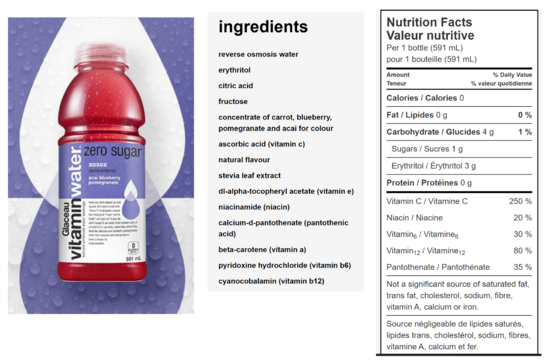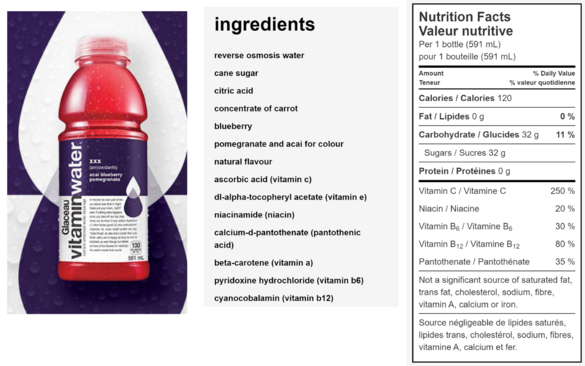Course:FNH200/Assignments/2020/Glaceau Vitamin Water vs Glaceau Vitamin Water Zero
Introduction
After doing exercises, people need lots of energy and water to replenish their body. Vitamin water can be a bottle of tasty hydration[1] to support us. We chose Glaceau Vitamin Water and Glaceau Vitamin Water Zero to compare and contrast.
Pictures
XOXOX (triple antioxidants)
acai blueberry pomegranate

XXX (triple antioxidants)
acai blueberry pomegranate

Ingredient lists
Vitamin Water Zero
reverse osmosis water, erythritol, citric acid, fructose, concentrate of carrot, blueberry, pomegranate and acai for colour, ascorbic acid (vitamin c), natural flavour, stevia leaf extract, dl-alpha-tocopheryl acetate (vitamin e), niacinamide (niacin), calcium-d-pantothenate (pantothenic acid), beta-carotene (vitamin a), pyridoxine hydrochloride (vitamin b6), cyanocobalamin (vitamin b12).
Vitamin Water Regular
reverse osmosis water, cane sugar, citric acid, concentrate of carrot, blueberry, pomegranate and acai for colour, natural flavour, ascorbic acid (vitamin c), dl-alpha-tocopheryl acetate (vitamin e), niacinamide (niacin), calcium-d-pantothenate (pantothenic acid), beta-carotene (vitamin a), pyridoxine hydrochloride (vitamin b6), cyanocobalamin (vitamin b12).
Fat substitutes, sugar substitutes, and/or additives used
Vitamin Water Zero
- Fat substitutes: None
- Sugar substitutes: erythritol
- Additives: citric acid, pomegranate and acai for colour
Vitamin Water Regular
- Fat substitutes: None
- Sugar substitutes:None
- Additives: citric acid, pomegranate and acai for colour
Natural flavour, ascorbic acid (vitamin c), dl-alpha-tocopheryl acetate (vitamin e), niacinamide (niacin), calcium-d-pantothenate (pantothenic acid), beta-carotene (vitamin a), pyridoxine hydrochloride (vitamin b6) and cyanocobalamin (vitamin b12) are vitamins added in the two products. In Canada, nutritive materials, vitamins, minerals and amino acids are not considered as additives.[2]
In Vitamin Water Zero, the sugar additives found is erythritol. It is one of sugar alcohols which found naturally in a wide variety of fruits and berries, and also commercially produced by hydrogenating sugars.[3] Erythritol is 60–70% as sweet as sucrose (table sugar)[4] and is safe for use (Acceptable Daily Intake2 (mg/kg body weight)=1000) compared to other sweeteners. In Vitamin Water Zero, erythritol provides sweet taste to the product, contributing almost zero calories.
Additives used in both Vitamin Water Regular and Vitamin Water Zero are citric acid, pomegranate and acai for colour. Citric acid is one of the stronger edible acids, and its dominant use in vitamin water as a flavoring and preservative. pomegranate and acai are colouring agents to produce an appealing appearance for vtiamin water (acai blueberry pomegranate flavor).
Compare and Contrast
- Vitamin Water Zero uses erythritol as sugar substitute, and Vitamin Water Regular uses cane sugar as source of sweetness.
- Vitamin Water Zero has few fructose (1 g), carbohydrate (4 g) and almost zero calorie in the drink. Vitamin Water Regular contain more sugar (32 g), carbohydrate (32 g) and thus more calories (140 cal).
- The two drinks contain equal amount of vitamins (ascorbic acid (vitamin c), dl-alpha-tocopheryl acetate (vitamin e), niacinamide (niacin), calcium-d-pantothenate (pantothenic acid), beta-carotene (vitamin a), pyridoxine hydrochloride (vitamin b6), cyanocobalamin (vitamin b12)).
- Although there is small amount of fructose (1 g) in Vitamin Water Zero, there are 32 g cane sugar in Vitamin Water Regular. Therefore, Vitamin Water Regular (cane sugar relative sweetness 0.9[5]) tastes sweeter than Vitamin Water Zero (erythritol relative sweetness 0.7[6]).
Labels (2 points)
- Provide detailed description of the information found on the labels
- Indicate whether the information complies with the regulatory requirements as outlined in Lesson 04.
References
- ↑ "Vitaminwater-xxx".
- ↑ Judy, Chan. "Food Additives".
- ↑ Chan, Judy. "Types of Sugar Substitutes - Sweeteners".
- ↑ "Erythritol". https://en.wikipedia.org/wiki/Erythritol. External link in
|website=(help) - ↑ "Sweeteners".
- ↑ "Sweeteners".
| This Food Science resource was created by Course:FNH200. |
